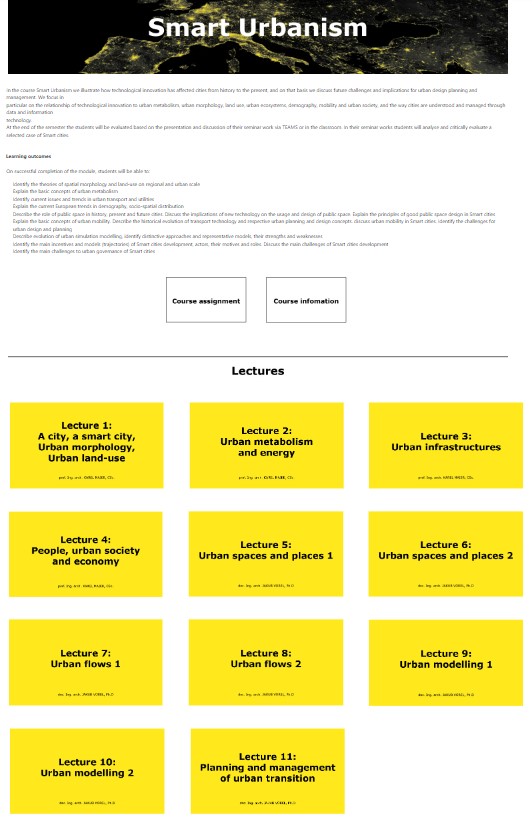In Smart Urbanism, we illustrate how technological innovation has affected cities from history to the present, and on that basis we discuss future challenges and implications for urban planning and management. We focus in particular on the relationship of technological innovation to urban metabolism (material and energy flows and reserves), urban morphology, land use, urban ecosystems, demography, mobility and urban society, and the way cities are understood and managed through data and information technology.
At the end of the semester the students will be evaluated based on the presentation and discussion of their seminar work via TEAMS or in the classroom. In their seminar works students will analyse and critically evaluate a selected case of Smart cities.
On successful completion of the module, students will be able to:
- Identify the theories of spatial morphology and land-use on regional and urban scale
- Explain the basic concepts of urban metabolism
- Identify current issues and trends in urban transport and utilities
- Explain the current trends in demography, socio-spatial distribution
- Describe the role of public space in history, present and future cities. Discuss the implications of new technology on the usage and design of public space. Explain the principles of good public space design in Smart cities
- Explain the basic concepts of urban mobility. Describe the historical evolution of transport technology and respective urban planning and design concepts. discuss urban mobility in Smart cities, social, environmental and economic implications. Identify the challenges for urban design and planning
- Describe evolution of urban simulation modelling, identify distinctive approaches and representative models, their strengths and weaknesses
- Identify the main incentives and models (trajectories) of Smart cities development, actors, their motives and roles. Discuss the main challenges of Smart cities development
- Identify the main challenges to urban governance of Smart cities
The course is open for students of Faculty of architecture and Faculty of Transportation CTU in Prague as well as for students of universities in EuroTeQ consorcium:
- Technical University of Munich (TUM)
- Technical University of Denmark (DTU)
- Eindhoven University of Technology (TU/e)
- École Polytechnique (l’X)
- Tallinn University of Technology (TalTech)
- Israel Institute of Technology (Technion)
The web page of the course in Moodle provides the registered students with the presentations and audio recordings of eleven lectures, the seven most significant cases of Smart Cities developments, the list of essential publications and extensive database of information sources.



